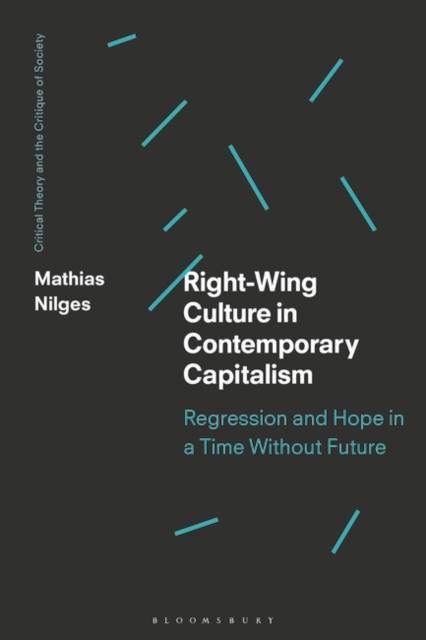
Bedankt voor het vertrouwen het afgelopen jaar! Om jou te bedanken bieden we GRATIS verzending (in België) aan op alles gedurende de hele maand januari.
- Afhalen na 1 uur in een winkel met voorraad
- In januari gratis thuislevering in België
- Ruim aanbod met 7 miljoen producten
Bedankt voor het vertrouwen het afgelopen jaar! Om jou te bedanken bieden we GRATIS verzending (in België) aan op alles gedurende de hele maand januari.
- Afhalen na 1 uur in een winkel met voorraad
- In januari gratis thuislevering in België
- Ruim aanbod met 7 miljoen producten
Zoeken
Right-Wing Culture in Contemporary Capitalism Regression and Hope in a Time Without Future
Regression and Hope in a Time Without Future
Mathias Nilges
€ 254,45
+ 508 punten
Omschrijving
Commentators across the political spectrum have argued that the future has been absorbed by an ever-expanding present to which we cannot imagine alternatives. The notion that we have lost the ability to imagine change-culturally, socially, and politically-has become one of the defining problems of our time. But what is the difference between the populist narratives of those who promise to solve this problem by returning us to a glorious past and those who promise to lead us into a glorious future? Often, this book argues, not very much at all. Revealing neo-authoritarianism and capitalist hyper-innovation as two sides of the same coin, Mathias Nilges shows that today's reactionaries and futurists both harness and profit from the same temporal crises of our present.
Looking to design, popular culture, literature, and recent theoretical and political discussions, Nilges offers ways of understanding the re-emergence of familiar and disturbing forms of right-wing politics and culture (authoritarianism, paternalism, fascism) not as historical repetition but as dangerous consequences of the contradictions of capitalism today. Using critical theory, in particular the work of Ernst Bloch, this book recovers a politics and culture of hope, which it locates beyond a future that is colonized by capitalism and a past that becomes the mystical playground for the new Right: in that which was never allowed to be and thus demands realization.
Looking to design, popular culture, literature, and recent theoretical and political discussions, Nilges offers ways of understanding the re-emergence of familiar and disturbing forms of right-wing politics and culture (authoritarianism, paternalism, fascism) not as historical repetition but as dangerous consequences of the contradictions of capitalism today. Using critical theory, in particular the work of Ernst Bloch, this book recovers a politics and culture of hope, which it locates beyond a future that is colonized by capitalism and a past that becomes the mystical playground for the new Right: in that which was never allowed to be and thus demands realization.
Specificaties
Betrokkenen
- Auteur(s):
- Uitgeverij:
Inhoud
- Aantal bladzijden:
- 216
- Taal:
- Engels
- Reeks:
- Reeksnummer:
- nr. 1
Eigenschappen
- Productcode (EAN):
- 9781350074064
- Verschijningsdatum:
- 12/12/2019
- Uitvoering:
- Hardcover
- Formaat:
- Genaaid
- Afmetingen:
- 160 mm x 236 mm
- Gewicht:
- 476 g

Alleen bij Standaard Boekhandel
+ 508 punten op je klantenkaart van Standaard Boekhandel
Beoordelingen
We publiceren alleen reviews die voldoen aan de voorwaarden voor reviews. Bekijk onze voorwaarden voor reviews.









